牛津译林八年级下册Unit 5 Good manners Reading(II) WheninRome课件(共21张PPT)
文档属性
| 名称 | 牛津译林八年级下册Unit 5 Good manners Reading(II) WheninRome课件(共21张PPT) | 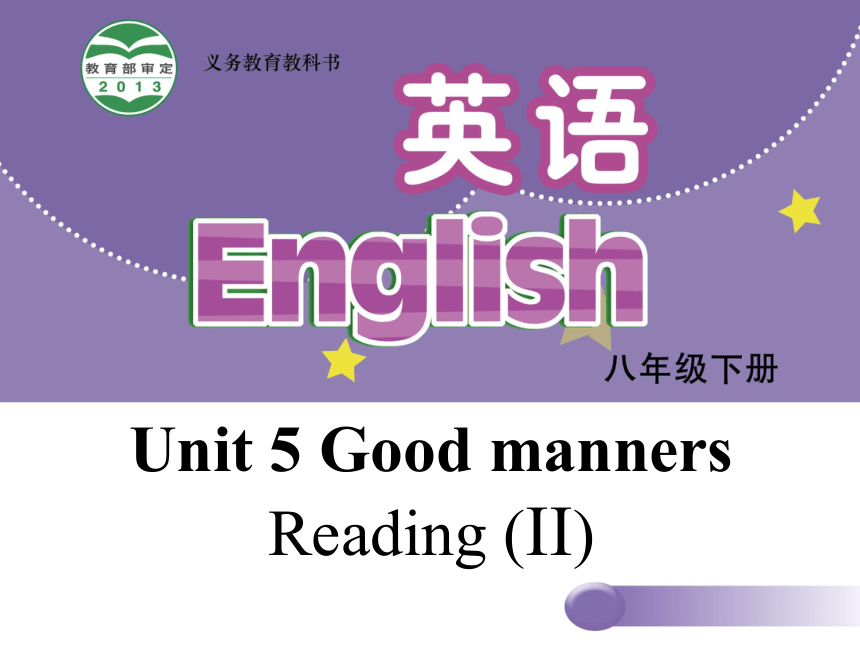 | |
| 格式 | zip | ||
| 文件大小 | 2.8MB | ||
| 资源类型 | 教案 | ||
| 版本资源 | 牛津译林版 | ||
| 科目 | 英语 | ||
| 更新时间 | 2022-04-12 13:17:09 | ||
图片预览

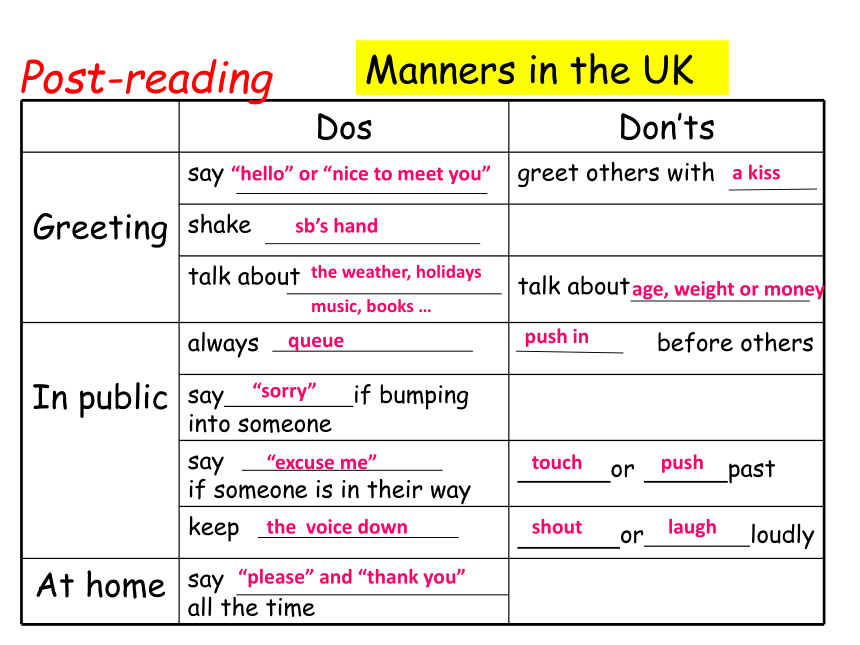
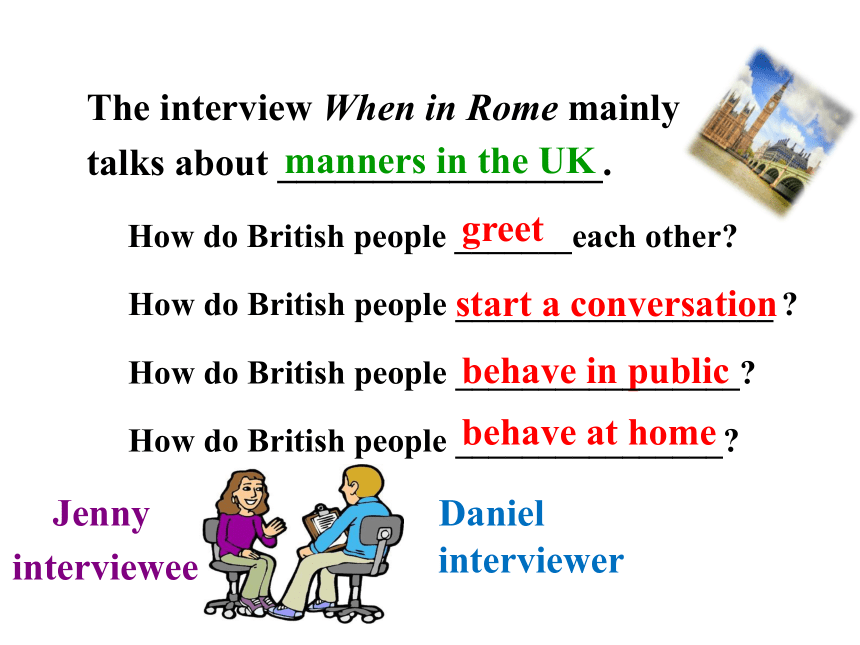
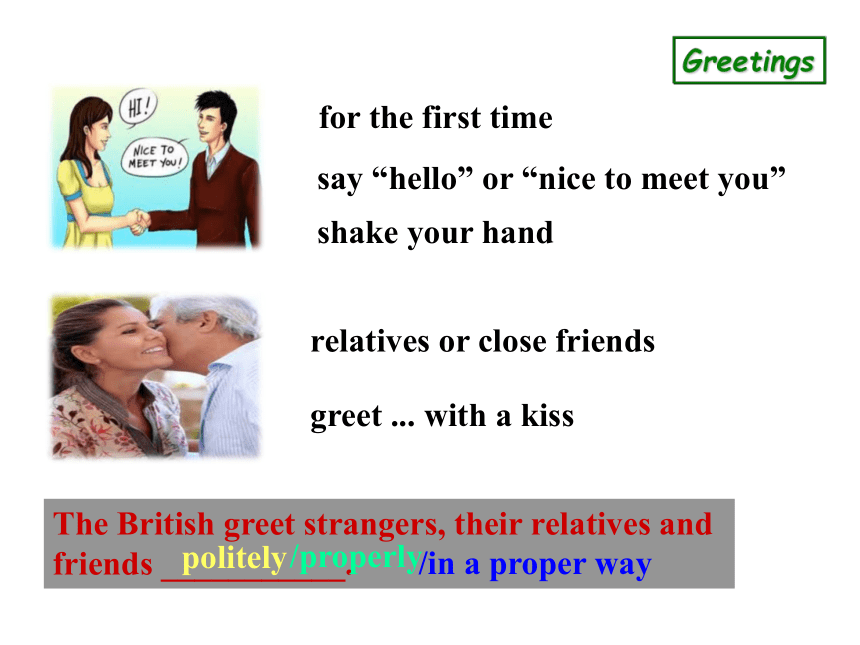
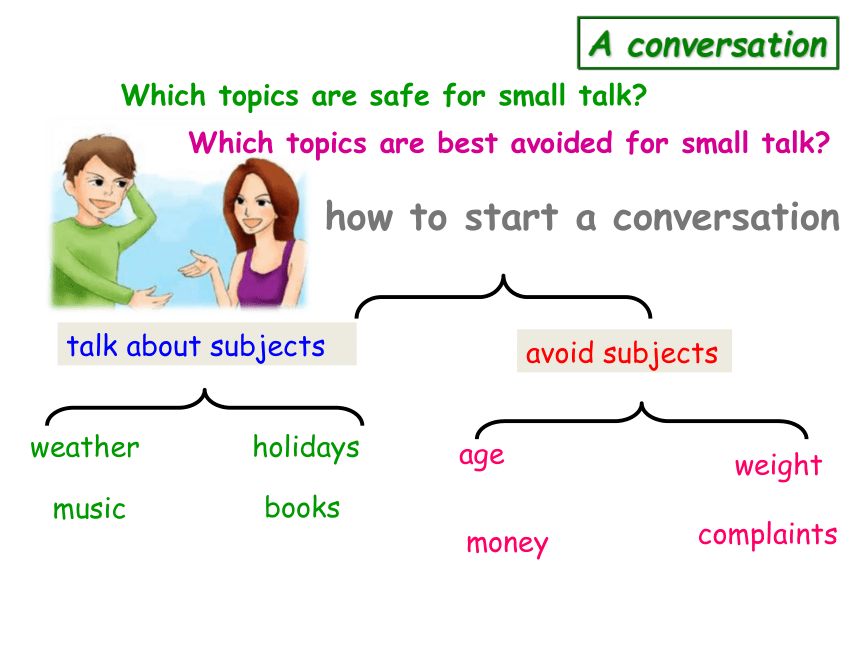
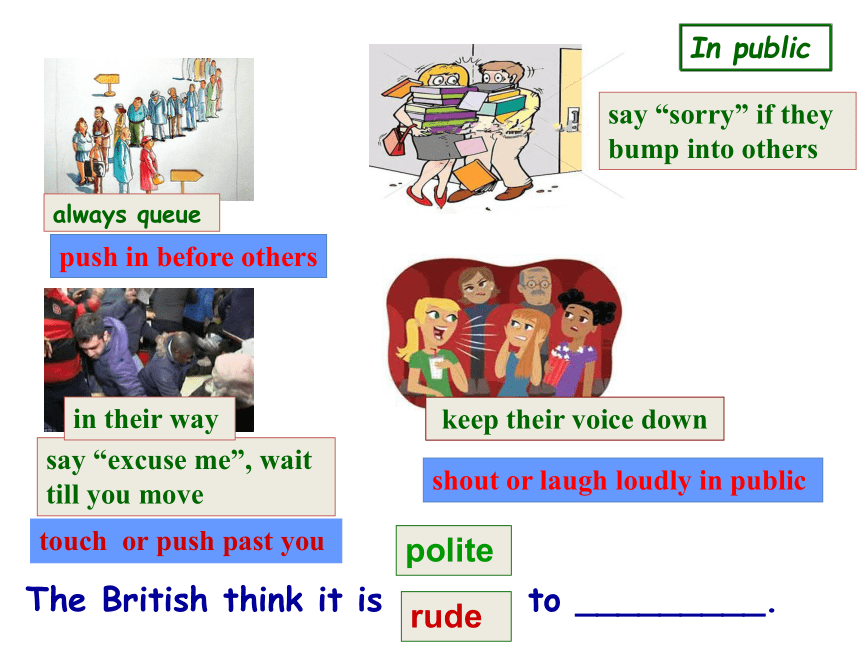
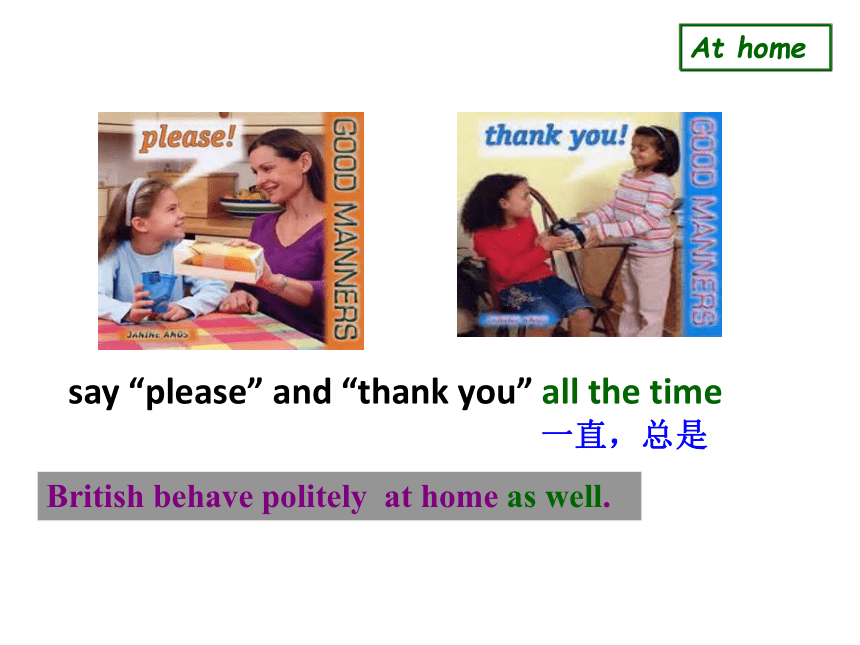
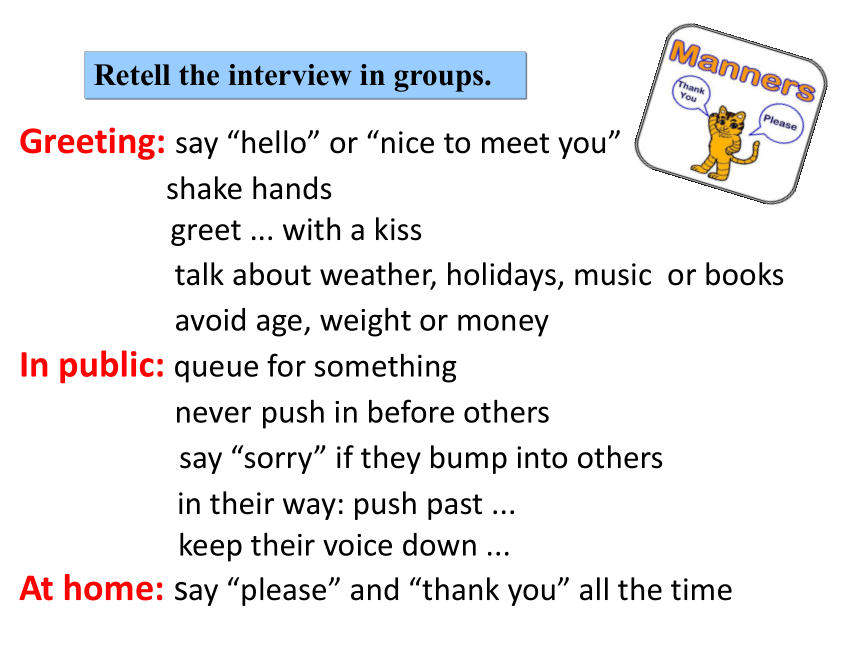
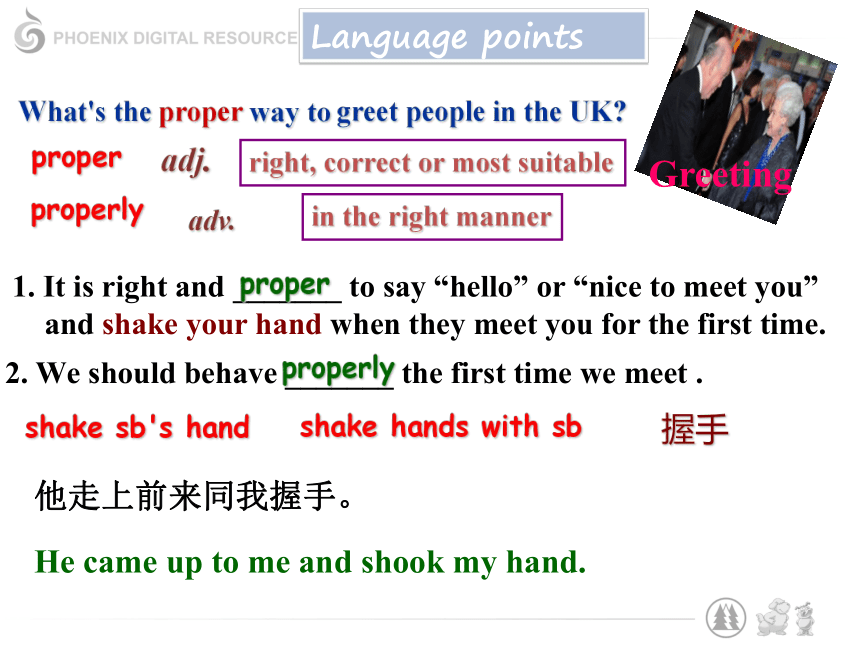
文档简介
(共21张PPT)
Unit 5 Good manners Reading (II)
Dos Don’ts
Greeting say greet others with
shake
talk about talk about
In public always before others
say if bumping into someone
say if someone is in their way or past
keep or loudly
At home say all the time
“hello” or “nice to meet you”
a kiss
age, weight or money
the weather, holidays
music, books …
push in
queue
sb’s hand
“sorry”
“excuse me”
touch
push
the voice down
shout
laugh
“please” and “thank you”
Manners in the UK
Post-reading
The interview When in Rome mainly
talks about _________________.
greet
start a conversation
behave in public
behave at home
manners in the UK
How do British people _______each other
How do British people ___________________
How do British people _________________
How do British people ________________
Jenny
Daniel
interviewee
interviewer
Greetings
say “hello” or “nice to meet you”
shake your hand
for the first time
relatives or close friends
greet ... with a kiss
The British greet strangers, their relatives and friends ___________.
politely
/properly
/in a proper way
talk about subjects
avoid subjects
age
weight
money
how to start a conversation
A conversation
books
weather
holidays
music
complaints
Which topics are best avoided for small talk
Which topics are safe for small talk
In public
always queue
push in before others
say “sorry” if they
bump into others
touch or push past you
say “excuse me”, wait till you move
shout or laugh loudly in public
keep their voice down
in their way
The British think it is to _________.
polite
rude
say “please” and “thank you” all the time
At home
British behave politely at home as well.
一直,总是
Greeting: say “hello” or “nice to meet you”
shake hands
greet ... with a kiss
talk about weather, holidays, music or books
avoid age, weight or money
In public: queue for something
never push in before others
say “sorry” if they bump into others
in their way: push past ...
keep their voice down ...
At home: say “please” and “thank you” all the time
Retell the interview in groups.
What's the proper way to greet people in the UK
right, correct or most suitable
proper
properly
adj.
adv.
in the right manner
1. It is right and _______ to say “hello” or “nice to meet you” and shake your hand when they meet you for the first time.
2. We should behave _______ the first time we meet .
shake sb's hand
Language points
Greeting
proper
shake hands with sb
他走上前来同我握手。
握手
He came up to me and shook my hand.
properly
Do you greet people with a kiss
The men stepped forward to kiss Angela Merkel’s hand.
She leaned up and kissed him on the cheek.
3.她倾身向前亲吻了他的面颊。
I put my arms around her and gave her a kiss.
British people only greet relatives or close friends with a kiss.
greet sb with a kiss
kiss sb as a greeting
1.我抱着她吻了她一下。
2.这位男子走上前去轻吻安格拉·默克尔的手。
n.
vt.
Language pionts
1. How do we Chinese greet people when we
meet for the first time
2. How do we greet relatives or close friends
Do we greet them with a kiss
Further thinking
Most Englishmen never hug or kiss other
men. They leave that to football players
and foreigners. Women may kiss on one
or both cheeks. Men may also kiss women
in greeting, but only on the cheek.
How do they start a conversation
start a conversation
开始交谈
They avoid subjects like age, weight or money.
avoid (doing) sth
避免(做)某事
1. 海伦避免在过于抛头露面的地方工作
Helen ______________ in places which are too public.
All through lunch he carefully ___________________________.
2. 整个午饭期间,他一直在小心翼翼地回避房子的话题。
avoids working
avoided the subject of the house
Why is the weather a great conversation starter
in Great Britain
Language points
Further thinking
Why is the weather such a popular
topic of conversation in Great Britain
British people will talk about the weather with friends, family or a stranger at the bus stop. The weather changes all the time in the UK. It can be warm and sunny in the morning, but cold and windy in the afternoon.
Another reason why people talk about the weather is that it's a safe topic to talk about. The weather affects us all and it is all around us. If we are communicating with someone for the first time (breaking the ice), the weather is a safe topic to bring up.
We could talk about politics, but we might have different views and start arguing. We could talk about football, but we might
support different teams and start fighting! British people generally don't like to offend or upset other people—so it's always better to choose a safe topic like weather to start a conversation.
Steve: Turned out nice again.
John: It's lovely. I think we might have a barbecue
this weekend.
Steve: That's a great idea.
John: Last time I had a barbecue it rained all night.
Steve: Typical.
John: I'll keep my fingers crossed for this weekend.
Typical British conversation on a sunny day
Small talk isn't just about chatting about
the weather. The real key to small talk is using
it to get to a meaningful conversation.
The real art of conversation is not only to say the right thing at the right place but to leave unsaid the wrong thing at the tempting moment.
-Dorothy Nevill
真正的谈话艺术不仅指在合适的场合说合适的话,
而且也指在不适当的场合对不该说的话守口如瓶。
-多萝西·内维尔
Language points
How politely do British people behave in public
The Brits are patient enough to queue till it is their turn. They never push/cut in before others.
插队
If they bump into smeone in the street, they will say “sorry”.
bump into sb/sth 撞上;偶然碰见
I tried to avoid her, but it was just my luck to _____________.
1.我不想见她, 偏撞上她了
Joanna heard him _________________ and curse again.
2. 乔安娜听见他撞到了桌子上,又骂骂咧咧的。
bump into her
bump into the table
挡道
in the way
挡住某人的路
3. You’re standing__________. Would you mind moving a little
in one’s way
If you’re in their way, they won’t touch you or push past you.
in the way
They'll say "excuse me" and be polite enough to wait till you move.
In public
Further thinking
If you are bumped into, what will you react
(反应)
British people even say “sorry” if you stand on their toes!
If someone is in your way, what will you do
What will we do if we bump into someone
British people are very polite at home
as well, aren't they
as well
也,还有
常位于句末,无须用逗号与句子分开。
as well as
它强调的是前一项,后一项只是顺便提及。
连接并列主语时,谓语动词与前一项一致。
1. He sent me a letter and some money __________.
2. I am going to London and my sister is going __________.
3. Lily __________ her parents is very fond of classical music.
4. We shall travel by day and by night ___________.
5. British people behave politely at home __________ in public .
6. British people are polite to family members _________ strangers.
as well
as well
as well
as well as
as well as
as well as
At home
Language focus
Etiquette expert William Hanson offers some advice
on the do’s and don’ts in the UK.
Good manners in the UK
In Britain you will find most people are kind to you if you behave ________________, respecting local people and customs.
Greeting can be a “hello” or “nice to meet you” the first time they meet you. They do ____________with each other, but as little as possible. They only greet relatives or close friends with a _____. The subject of the weather is a great ____________ starter in Great Britain. The worst mistake a visitor to Britain can make is talking about ______. They don't want to tell people how much it cost, or how much they're about to spend.
However, in other countries, it’s considered _______ talk. Avoid talking about football _______, because you might support different teams.
Complete the article according to what we’ve learned.
shake hands
kiss
conversation
politely/properly
money
small
as well
British people think it is rude to _________ before others. They always ______. _______ space is another area to be aware of. They make great efforts not to ________ strangers even by accident. If you are standing __________, they'll be ___________ enough to wait till you move. They usually keep their voice down _________. British people are very polite to strangers, friends ________family members. They say “please” or “thank you” __________.
The British love saying “_____”. They just can't say it _______, even if it's not their fault and somebody __________them.
It is common to offer a tip (小费), but in the UK it is done ______ and depends on the quality of the ______.
Afternoon tea is a very British past time. Remember the milk should go in _____ and not first.
.
When we go the UK, we'd better remember the famous saying “When in Rome, do as (12) ___________ do.”
push in
queue
touch
in their way
as well as
all the time
in public
sorry
enough
bumps into
quietly
service
last
Personal
patient/polite
Homework
Learn the new words and phrases by heart.
2. Retell the interview.
Unit 5 Good manners Reading (II)
Dos Don’ts
Greeting say greet others with
shake
talk about talk about
In public always before others
say if bumping into someone
say if someone is in their way or past
keep or loudly
At home say all the time
“hello” or “nice to meet you”
a kiss
age, weight or money
the weather, holidays
music, books …
push in
queue
sb’s hand
“sorry”
“excuse me”
touch
push
the voice down
shout
laugh
“please” and “thank you”
Manners in the UK
Post-reading
The interview When in Rome mainly
talks about _________________.
greet
start a conversation
behave in public
behave at home
manners in the UK
How do British people _______each other
How do British people ___________________
How do British people _________________
How do British people ________________
Jenny
Daniel
interviewee
interviewer
Greetings
say “hello” or “nice to meet you”
shake your hand
for the first time
relatives or close friends
greet ... with a kiss
The British greet strangers, their relatives and friends ___________.
politely
/properly
/in a proper way
talk about subjects
avoid subjects
age
weight
money
how to start a conversation
A conversation
books
weather
holidays
music
complaints
Which topics are best avoided for small talk
Which topics are safe for small talk
In public
always queue
push in before others
say “sorry” if they
bump into others
touch or push past you
say “excuse me”, wait till you move
shout or laugh loudly in public
keep their voice down
in their way
The British think it is to _________.
polite
rude
say “please” and “thank you” all the time
At home
British behave politely at home as well.
一直,总是
Greeting: say “hello” or “nice to meet you”
shake hands
greet ... with a kiss
talk about weather, holidays, music or books
avoid age, weight or money
In public: queue for something
never push in before others
say “sorry” if they bump into others
in their way: push past ...
keep their voice down ...
At home: say “please” and “thank you” all the time
Retell the interview in groups.
What's the proper way to greet people in the UK
right, correct or most suitable
proper
properly
adj.
adv.
in the right manner
1. It is right and _______ to say “hello” or “nice to meet you” and shake your hand when they meet you for the first time.
2. We should behave _______ the first time we meet .
shake sb's hand
Language points
Greeting
proper
shake hands with sb
他走上前来同我握手。
握手
He came up to me and shook my hand.
properly
Do you greet people with a kiss
The men stepped forward to kiss Angela Merkel’s hand.
She leaned up and kissed him on the cheek.
3.她倾身向前亲吻了他的面颊。
I put my arms around her and gave her a kiss.
British people only greet relatives or close friends with a kiss.
greet sb with a kiss
kiss sb as a greeting
1.我抱着她吻了她一下。
2.这位男子走上前去轻吻安格拉·默克尔的手。
n.
vt.
Language pionts
1. How do we Chinese greet people when we
meet for the first time
2. How do we greet relatives or close friends
Do we greet them with a kiss
Further thinking
Most Englishmen never hug or kiss other
men. They leave that to football players
and foreigners. Women may kiss on one
or both cheeks. Men may also kiss women
in greeting, but only on the cheek.
How do they start a conversation
start a conversation
开始交谈
They avoid subjects like age, weight or money.
avoid (doing) sth
避免(做)某事
1. 海伦避免在过于抛头露面的地方工作
Helen ______________ in places which are too public.
All through lunch he carefully ___________________________.
2. 整个午饭期间,他一直在小心翼翼地回避房子的话题。
avoids working
avoided the subject of the house
Why is the weather a great conversation starter
in Great Britain
Language points
Further thinking
Why is the weather such a popular
topic of conversation in Great Britain
British people will talk about the weather with friends, family or a stranger at the bus stop. The weather changes all the time in the UK. It can be warm and sunny in the morning, but cold and windy in the afternoon.
Another reason why people talk about the weather is that it's a safe topic to talk about. The weather affects us all and it is all around us. If we are communicating with someone for the first time (breaking the ice), the weather is a safe topic to bring up.
We could talk about politics, but we might have different views and start arguing. We could talk about football, but we might
support different teams and start fighting! British people generally don't like to offend or upset other people—so it's always better to choose a safe topic like weather to start a conversation.
Steve: Turned out nice again.
John: It's lovely. I think we might have a barbecue
this weekend.
Steve: That's a great idea.
John: Last time I had a barbecue it rained all night.
Steve: Typical.
John: I'll keep my fingers crossed for this weekend.
Typical British conversation on a sunny day
Small talk isn't just about chatting about
the weather. The real key to small talk is using
it to get to a meaningful conversation.
The real art of conversation is not only to say the right thing at the right place but to leave unsaid the wrong thing at the tempting moment.
-Dorothy Nevill
真正的谈话艺术不仅指在合适的场合说合适的话,
而且也指在不适当的场合对不该说的话守口如瓶。
-多萝西·内维尔
Language points
How politely do British people behave in public
The Brits are patient enough to queue till it is their turn. They never push/cut in before others.
插队
If they bump into smeone in the street, they will say “sorry”.
bump into sb/sth 撞上;偶然碰见
I tried to avoid her, but it was just my luck to _____________.
1.我不想见她, 偏撞上她了
Joanna heard him _________________ and curse again.
2. 乔安娜听见他撞到了桌子上,又骂骂咧咧的。
bump into her
bump into the table
挡道
in the way
挡住某人的路
3. You’re standing__________. Would you mind moving a little
in one’s way
If you’re in their way, they won’t touch you or push past you.
in the way
They'll say "excuse me" and be polite enough to wait till you move.
In public
Further thinking
If you are bumped into, what will you react
(反应)
British people even say “sorry” if you stand on their toes!
If someone is in your way, what will you do
What will we do if we bump into someone
British people are very polite at home
as well, aren't they
as well
也,还有
常位于句末,无须用逗号与句子分开。
as well as
它强调的是前一项,后一项只是顺便提及。
连接并列主语时,谓语动词与前一项一致。
1. He sent me a letter and some money __________.
2. I am going to London and my sister is going __________.
3. Lily __________ her parents is very fond of classical music.
4. We shall travel by day and by night ___________.
5. British people behave politely at home __________ in public .
6. British people are polite to family members _________ strangers.
as well
as well
as well
as well as
as well as
as well as
At home
Language focus
Etiquette expert William Hanson offers some advice
on the do’s and don’ts in the UK.
Good manners in the UK
In Britain you will find most people are kind to you if you behave ________________, respecting local people and customs.
Greeting can be a “hello” or “nice to meet you” the first time they meet you. They do ____________with each other, but as little as possible. They only greet relatives or close friends with a _____. The subject of the weather is a great ____________ starter in Great Britain. The worst mistake a visitor to Britain can make is talking about ______. They don't want to tell people how much it cost, or how much they're about to spend.
However, in other countries, it’s considered _______ talk. Avoid talking about football _______, because you might support different teams.
Complete the article according to what we’ve learned.
shake hands
kiss
conversation
politely/properly
money
small
as well
British people think it is rude to _________ before others. They always ______. _______ space is another area to be aware of. They make great efforts not to ________ strangers even by accident. If you are standing __________, they'll be ___________ enough to wait till you move. They usually keep their voice down _________. British people are very polite to strangers, friends ________family members. They say “please” or “thank you” __________.
The British love saying “_____”. They just can't say it _______, even if it's not their fault and somebody __________them.
It is common to offer a tip (小费), but in the UK it is done ______ and depends on the quality of the ______.
Afternoon tea is a very British past time. Remember the milk should go in _____ and not first.
.
When we go the UK, we'd better remember the famous saying “When in Rome, do as (12) ___________ do.”
push in
queue
touch
in their way
as well as
all the time
in public
sorry
enough
bumps into
quietly
service
last
Personal
patient/polite
Homework
Learn the new words and phrases by heart.
2. Retell the interview.
